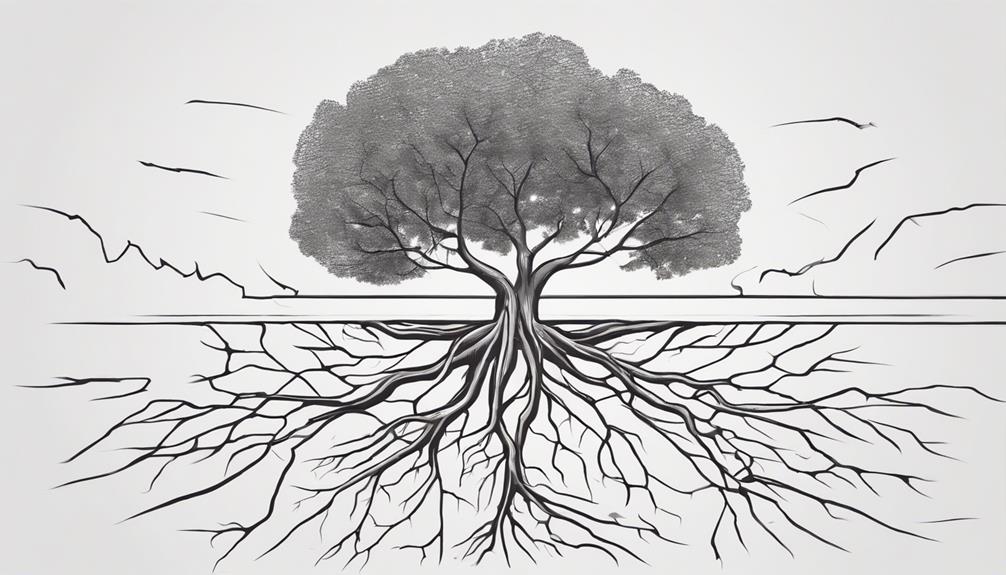Self-awareness, a fundamental aspect of human cognition, has garnered attention in various disciplines due to its profound implications on individual well-being and interpersonal relationships. Understanding the intricacies of one's thoughts, emotions, and behaviors serves as a cornerstone for personal growth and psychological resilience. Moreover, self-awareness plays a pivotal role in enhancing emotional intelligence, which in turn, influences decision-making and social interactions. The question arises: how does self-awareness shape our perceptions, actions, and relationships, and what are the far-reaching implications of this introspective ability?
Key Takeaways
- Self-awareness enhances personal growth through emotional regulation and self-confidence.
- It positively impacts mental health by managing stress, anxiety, and fostering mindfulness.
- Strategies like recognizing blind spots and improving self-regulation aid in self-improvement.
- Self-awareness benefits interpersonal relationships by improving communication, empathy, and conflict resolution.
Definition of Self-Awareness

Self-awareness is a fundamental cognitive capacity that encompasses a person's conscious understanding of their own character, emotions, motives, and desires. It involves the ability to objectively evaluate one's actions, thoughts, and emotions, leading to a deeper comprehension of oneself. This self-evaluation can take two forms: public self-awareness, which involves an individual's awareness of how they appear to others, and private self-awareness, which involves reflecting on one's internal state.
The importance of self-awareness lies in its role in personal growth and emotional intelligence. Individuals who possess a high level of self-awareness are better equipped to understand their strengths and weaknesses, enabling them to make informed decisions about their personal development. Moreover, self-awareness facilitates a greater understanding of one's emotions, leading to improved emotional regulation and social interactions. In essence, cultivating self-awareness is a crucial aspect of fostering personal growth and enhancing emotional intelligence.
Impact on Personal Growth
Enhancing one's self-awareness has a profound impact on personal growth, fostering emotional intelligence and contributing to a deeper understanding of oneself. Self-awareness holds the power to transform individuals by enabling them to delve into their inner workings, emotions, and behaviors. By being able to recognize and understand their own thoughts and feelings, individuals can embark on a journey of personal growth that is both enlightening and empowering. The impact of self-awareness on personal growth can be further understood through the following points:
- Enhanced Emotional Regulation: Self-aware individuals are better equipped to manage their emotions, leading to more balanced reactions and improved decision-making skills.
- Increased Self-Confidence: Understanding one's strengths and weaknesses allows for the development of self-assurance and belief in one's abilities.
- Deeper Self-Understanding: Through self-reflection and introspection, individuals are able to gain insights into their motivations, values, and aspirations, fostering personal growth and development.
Self-awareness, therefore, plays a crucial role in shaping personal growth by empowering individuals to understand themselves more deeply and navigate their life paths with clarity and purpose.
Link to Mental Health

Self-awareness has been associated with positive mental health outcomes, demonstrating a clear link between self-perception and emotional well-being. Understanding one's thoughts, feelings, and behaviors enables individuals to effectively manage stress and anxiety, promoting overall mental wellness. By fostering mindfulness and self-reflection, individuals can proactively address their mental health needs and develop coping strategies for improved emotional regulation.
Self-Awareness and Well-Being
The symbiotic relationship between self-awareness and mental well-being is well-documented in scientific literature, highlighting the profound impact self-awareness has on an individual's overall psychological health. When it comes to mental health outcomes, self-awareness plays a crucial role in reducing stress, anxiety, and depression. Here are three key ways in which self-awareness contributes to well-being:
- Individuals with higher levels of self-awareness are better equipped to manage their emotions and cope with challenges effectively.
- Cultivating self-awareness can lead to increased self-acceptance and a more positive self-image, contributing to mental health.
- Research suggests that self-awareness is a key factor in promoting resilience and enhancing mental health resilience.
Mindfulness and Mental Health
The integration of mindfulness practices into mental health interventions has garnered significant attention for its demonstrated effectiveness in improving psychological well-being and coping mechanisms. Mindfulness practices, such as meditation and deep breathing exercises, have been linked to reducing symptoms of anxiety, depression, and stress, thus promoting mental well-being. By cultivating self-awareness through mindfulness techniques, individuals can enhance emotional regulation and resilience, which are crucial aspects of mental health management. Research indicates that mindfulness interventions play a pivotal role in enhancing overall mental health outcomes and reducing psychological distress. These practices have been incorporated into various mental health treatment plans to address conditions like PTSD, OCD, and substance abuse, showing promising results in improving coping strategies and fostering greater self-awareness for better mental health management.
Enhancing Emotional Intelligence
Enhancing emotional intelligence through self-awareness involves a crucial process of self-reflection for personal growth. Understanding emotions better allows individuals to navigate through various situations with increased emotional competence. By honing these skills, individuals can cultivate stronger relationships and make informed decisions based on their emotional awareness.
Self-Reflection for Growth
Self-reflection plays a pivotal role in fostering emotional intelligence and facilitating personal growth. When individuals engage in self-reflection, they gain a deeper understanding of their emotions, thoughts, and behaviors. This process leads to enhanced decision-making and communication skills. Through self-awareness cultivated by reflection, individuals can effectively regulate their emotions and establish more meaningful relationships. Developing self-awareness through self-reflection also brings about a sense of clarity, confidence, and empathy. By taking the time to reflect on their experiences and reactions, individuals can identify patterns, triggers, and areas for improvement, ultimately contributing to their emotional intelligence and personal growth.
Understanding Emotions Better
Self-awareness, particularly in understanding emotions better, is a fundamental aspect of enhancing emotional intelligence and fostering personal growth. By developing self-awareness, individuals can understand things from multiple perspectives, identify emotional triggers, and effectively regulate their emotions. This heightened emotional intelligence enables individuals to make responsible decisions based on their emotional awareness, ultimately improving their self-management skills. Practicing techniques such as deep breathing and journaling can further enhance emotional intelligence by promoting self-reflection and emotional regulation. Additionally, fostering self-awareness in children involves teaching them to recognize their feelings, understand emotional triggers, and address their emotional needs for overall well-being. In essence, understanding emotions better through self-awareness is crucial for enhancing emotional intelligence and promoting personal development.
Recognizing Blind Spots

Uncovering and acknowledging blind spots is essential for individuals seeking to enhance their self-awareness through objective self-assessment and feedback mechanisms. Blind spots, if left unaddressed, can impede self-awareness by distorting one's perception of themselves and their abilities. To recognize blind spots effectively, individuals can:
- Seek feedback: Actively solicit input from trusted peers, mentors, or coaches to gain insights into areas that may be overlooked individually.
- Engage in self-reflection: Take time to introspect and analyze past behaviors, thoughts, and reactions to identify patterns or inconsistencies that may indicate blind spots.
- Utilize assessments: Use tools like personality assessments or 360-degree feedback surveys to gather comprehensive data on various aspects of one's behavior and traits, helping uncover blind spots that might otherwise go unnoticed.
Improving Self-Regulation
Enhancing self-regulation involves cultivating mindful emotional responses, developing impulse control, and honing decision-making skills. By being self-aware, individuals can better understand their emotional triggers and implement strategies to manage their reactions effectively. This self-regulation is crucial for maintaining composure in challenging situations, leading to improved behavior control and stress management.
Mindful Emotional Responses
Practicing mindful emotional responses is key to enhancing self-regulation and fostering emotional intelligence in individuals. Mindful responses enable individuals to pause and think before reacting impulsively, promoting a deeper understanding of their emotions and behaviors. This, in turn, contributes to reduced stress levels and an overall improved sense of well-being. Furthermore, by cultivating mindful responses, individuals are better equipped to make thoughtful and intentional decisions, particularly in challenging situations. This heightened emotional awareness also enhances communication skills and nurtures healthier relationships by fostering empathy, understanding, and effective conflict resolution. Overall, integrating mindful emotional responses into daily interactions can lead to increased self-regulation, emotional intelligence, and overall psychological well-being.
Developing Impulse Control
Developing impulse control is a fundamental aspect of improving self-regulation, allowing individuals to effectively manage their emotions and reactions. Self-regulation plays a crucial role in enhancing emotional intelligence and promoting better conflict resolution skills. It involves recognizing triggers that lead to impulsive behavior and implementing strategies to regulate these impulses. By honing impulse control, individuals can make more thoughtful decisions rather than acting impulsively. This practice leads to increased self-awareness and improved overall well-being. Understanding the relationship between self-regulation, impulse control, and emotional intelligence is essential for fostering a balanced and harmonious internal state, which ultimately impacts one's interactions with others and decision-making processes.
Enhancing Decision-Making Skills
Improving decision-making skills involves honing self-regulation mechanisms to mitigate impulsive tendencies and enhance cognitive processes. When aiming to become better decision-makers, individuals should focus on recognizing personal biases, understanding emotions that may cloud judgment, and practicing self-awareness techniques. By actively engaging in self-reflection and mindfulness practices, individuals can cultivate a heightened sense of self-awareness. This heightened self-awareness enables better recognition of one's cognitive biases and emotional influences, leading to more rational and objective decision-making. Studies have shown that individuals with improved self-awareness tend to make more thoughtful and strategic decisions, considering long-term consequences and evaluating options more effectively. By incorporating these practices, individuals can enhance their decision-making skills and make more informed choices.
Building Healthier Relationships
In fostering healthier relationships, the cultivation of self-awareness plays a pivotal role in enhancing empathy, understanding, and effective communication skills among individuals. Self-awareness allows individuals to better understand their own emotions and reactions, helping them manage triggers that may lead to conflicts in relationships. By recognizing and addressing these triggers, individuals can engage in more meaningful and constructive interactions, ultimately fostering better communication within relationships. This improved communication, based on self-awareness, reduces misunderstandings and promotes a harmonious environment where conflicts are less likely to arise.
Moreover, self-aware individuals are more inclined to take responsibility for their actions and emotions, leading to a more positive dynamic in relationships. This sense of accountability further enhances trust between individuals, as it demonstrates reliability and integrity. Ultimately, cultivating self-awareness in relationships can result in increased trust, respect, and intimacy, laying a solid foundation for healthy and fulfilling connections.
Fostering Resilience

Fostering resilience through self-awareness is a key factor in enabling individuals to effectively navigate challenges and setbacks in various aspects of life. This process involves developing coping strategies, emotional regulation, and problem-solving skills, which are essential for building psychological strength. Here are three critical ways in which self-awareness contributes to fostering resilience:
- Adaptation to Change: Self-aware individuals are better equipped to adapt to unexpected changes and uncertainties. By understanding their emotions, thoughts, and behaviors, they can effectively respond to new situations and challenges.
- Overcoming Adversity: Self-awareness enables individuals to recognize their strengths and weaknesses, allowing them to develop strategies to overcome adversity. This self-reflection fosters a growth mindset, encouraging personal development and resilience in the face of obstacles.
- Promoting Mental Well-being: Building resilience through self-awareness enhances mental well-being by reducing stress and promoting emotional stability. This process empowers individuals to navigate life's complexities with confidence and a sense of inner strength, leading to overall personal growth.
Tools for Self-Awareness
What are the effective tools that individuals can utilize to enhance their self-awareness? Tools for self-awareness encompass various techniques such as journaling, seeking feedback, and practicing mindfulness. Journaling serves as a powerful tool for self-awareness by allowing individuals to track their thoughts, emotions, and behaviors. It helps in monitoring both private and public selves, recognizing patterns, and setting intentions for personal growth. Seeking feedback from others is another valuable tool that aids in understanding disparities between self-perception and external feedback, thus revealing blind spots for self-awareness improvement. Additionally, practicing mindfulness through activities like deep breathing, meditation, and staying present in the moment can significantly contribute to cultivating self-awareness. Engaging in self-reflection exercises and participating in workshops are also recognized as effective tools for individuals aiming to develop a deeper sense of self-awareness. By employing these tools consistently, individuals can enhance their self-awareness and foster personal growth.
Self-Awareness in Daily Life

Self-awareness plays a pivotal role in daily life, enabling individuals to gain a deeper understanding of their character, emotions, and motivations. In practical terms, self-awareness manifests in various ways that contribute to personal growth and social interactions:
- Better Decision-Makers: By being aware of their values, beliefs, and goals, individuals can make decisions that align with their authentic selves. This self-understanding helps in evaluating options more effectively and choosing the most suitable path.
- Communication Skills: Self-aware individuals are more attuned to how they express themselves and how others perceive them. This awareness allows for clearer and more effective communication, leading to fewer misunderstandings and improved relationships.
- Stronger Relationships: Understanding one's emotions and reactions enables individuals to empathize better with others, resolve conflicts constructively, and build stronger connections. Self-awareness fosters mutual respect, trust, and intimacy in relationships, enhancing overall well-being.
In essence, practicing self-awareness in daily life not only benefits the individual but also contributes positively to their interactions with others, making them more conscientious decision-makers and better communicators.
Frequently Asked Questions
Why Self-Awareness Is Important to Our Life?
Self-awareness plays a pivotal role in our lives due to its impact on personal growth, emotional intelligence, relationships, communication skills, mental health, and mindfulness. Understanding oneself leads to improved decision-making, self-regulation, and empathy. It enables individuals to navigate various life situations with confidence and creativity, contributing to success in both personal and professional endeavors. The ability to introspect and recognize one's thoughts, feelings, and behaviors is fundamental for holistic well-being and effective social interactions.
How Effective Is Self-Awareness?
Self-awareness is a cornerstone of personal growth and emotional intelligence. It greatly impacts workplace productivity by enhancing leadership skills and decision-making abilities. Moreover, it plays a crucial role in improving relationship dynamics. Individuals who possess self-awareness are better equipped to navigate challenges, communicate effectively, and make informed choices, ultimately leading to more fulfilling personal and professional lives.
What Happens if You Don't Have Self-Awareness?
Without self-awareness, individuals may struggle to navigate social interactions effectively. This can lead to difficulties in understanding one's emotions, resulting in emotional instability. Lack of introspection hinders personal growth by impeding the identification of strengths and weaknesses. Decision-making may suffer as motivations and values remain unclear. Empathy and conflict resolution skills may also be compromised, impacting relationships. Overall, self-awareness plays a crucial role in mental well-being and social dynamics.
Why Self-Awareness Is the Key to Success?
Self-awareness can be likened to a compass guiding success. It fosters personal growth and emotional intelligence, essential for career advancement and effective relationship building. Decision-making and conflict resolution are enhanced by self-aware individuals who understand their strengths and limitations. By acknowledging and understanding their own emotions and behaviors, individuals can navigate challenges with resilience and empathy, paving the way for success in various aspects of life.
Conclusion
In conclusion, self-awareness plays a crucial role in personal development, emotional intelligence, and overall well-being. By understanding oneself and recognizing blind spots, individuals can build healthier relationships, foster resilience, and make better decisions. For example, a study conducted on individuals who practiced self-reflection consistently showed higher levels of self-awareness, leading to improved mental health and enhanced problem-solving skills. Self-awareness is a powerful tool that can greatly impact various aspects of one's life.
